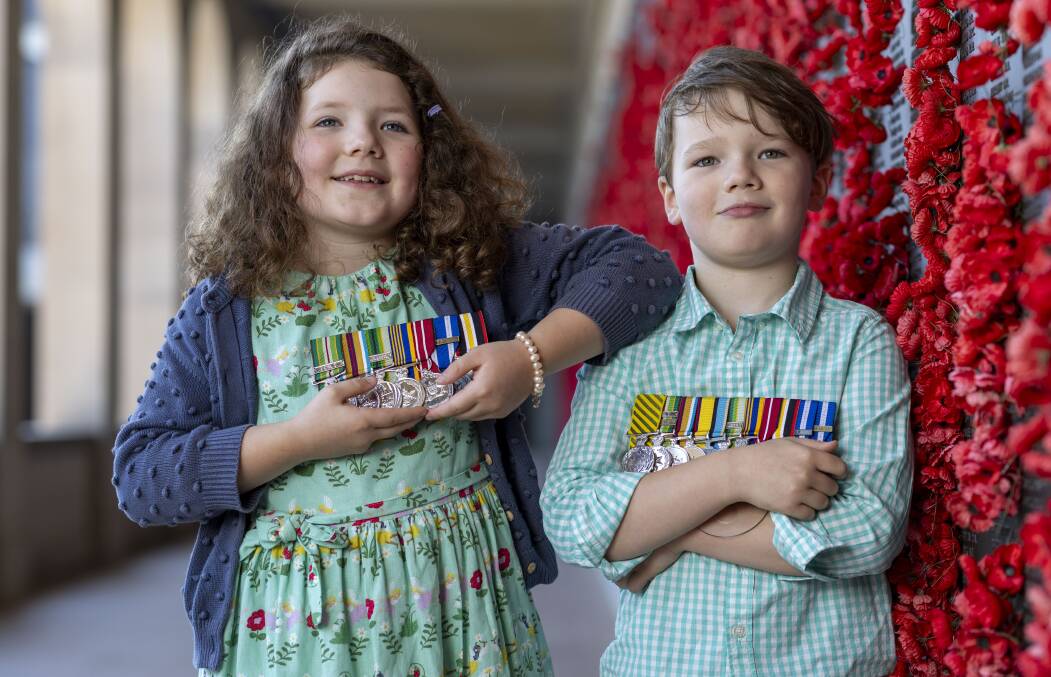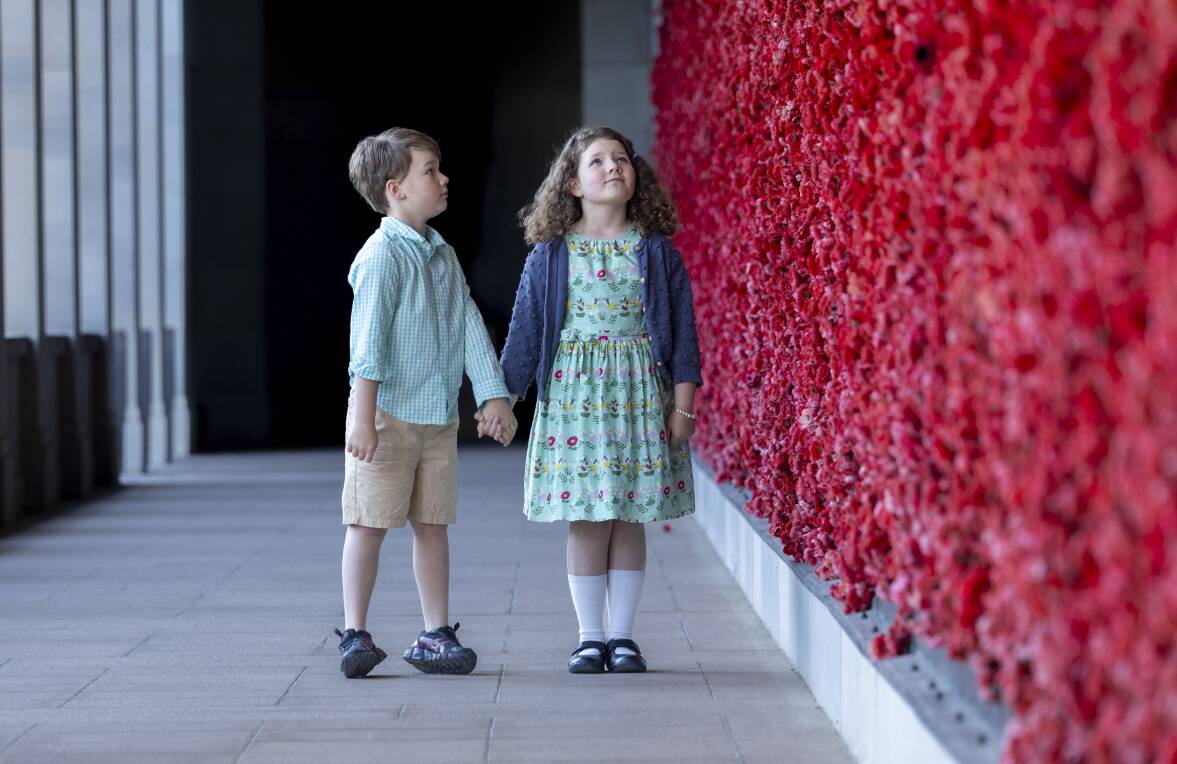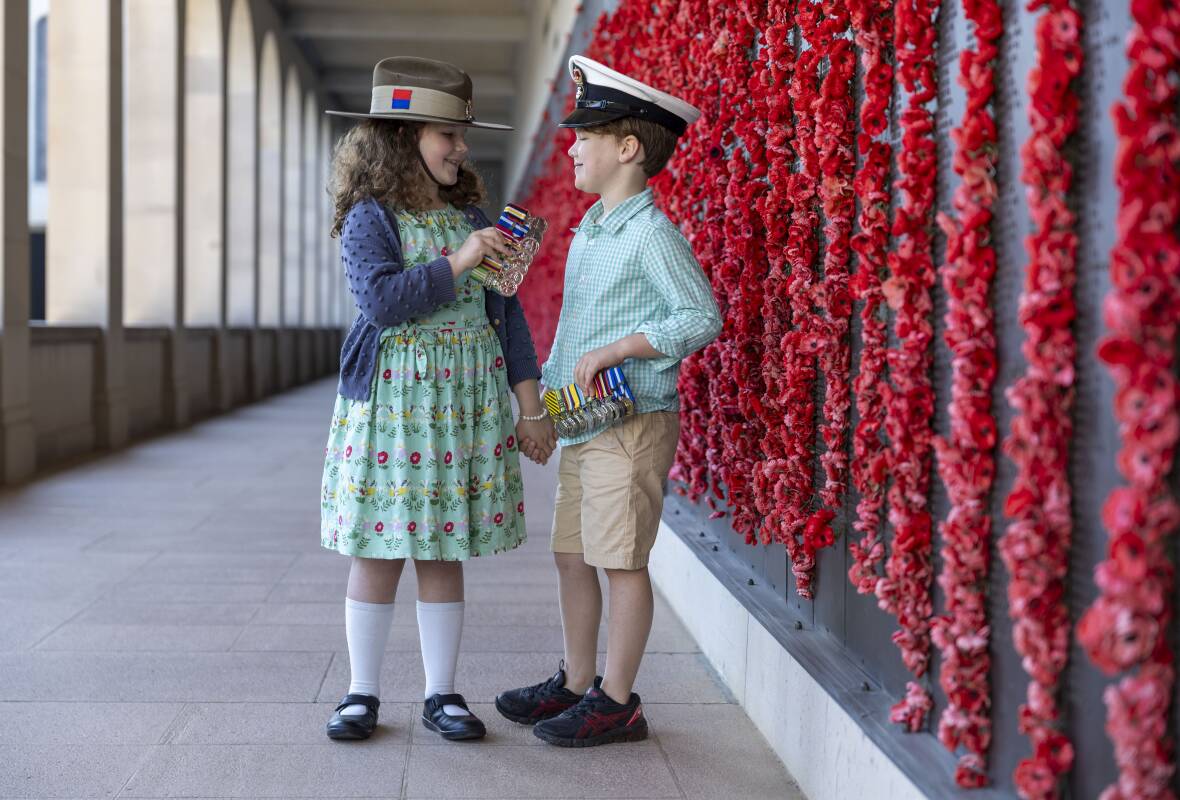Their little chests are not quite big enough to hang the four generations of their family's war medals from, so the siblings held onto them instead when they visited the Australian War Memorial in Canberra.

Dressed in a floral dress and a blue cardigan, Mathilda stood with her younger sibling, Lucas, both wearing their parent's military hats and standing beside the thousands of bright red poppies at the Roll of Honour, where the pair embraced their history.
The Roll of Honour contains the names of over 103,000 members of the Australian armed forces who have died during or as a result of war service.
Eight-year-old Mathilda Berry and her brother Lucas, 6, come from a family with a long and rich military history.
They visited the Australian War Memorial last week with four generations of family war medals to pay respect to those who died in wars involving Australia.
Each year, the question arises as to why the memory of the Anzac has such profound national recognition after our first significant defeat and whether it is still relevant today.
The answer for at least two of the younger generation in Canberra is an overwhelming yes; it does matter.
"On Anzac Day, we remember the Australian and New Zealand military people who died so we could live in peace," Mathilda said.
"I feel sad for the families whose mum or dad didn't return to Australia. We help remember their service."
Their parents have served in the Australian Defence Force for more than 45 years between them, with multiple operational tours overseas.
Their grandfather, Able Seaman Geoff Berry, joined the Royal Australian Navy from Tasmania and served six years, including operational service in Malaya.

Their great-great-grandfather, career soldier Warrant Officer Gerald Golledge, was a sergeant-major in the British Royal Artillery.
The Japanese took him prisoner during the fall of Hong Kong in 1941 and he later died during repatriation.
Somalia, Timor-Leste and Afghanistan veteran Bruce Johnson said Anzac Day remains important because it was about contemplating the sacrifices of the many people who died on the battlefield.
"It is not about glorifying war but instead reminding us of some of the true values we still hold dear in our hearts: endurance, determination, courage, honour, discipline, mateship, and a good sense of humour".
Those same values prompted hundreds of thousands of young Australian men to volunteer to fight on foreign soil for the sake of the empire.
One-hundred-and-nine years ago today - on the morning of April 25, 1915 - soldiers of the Australian Imperial Forces stormed the beaches at Gallipoli.
They were the Australian and New Zealand Army Corps, and it was the birth of a legend known as the Anzacs.
However, it was also Australia's first significant loss on the battlefield, with more than 8000 young Australians and a total of 58,000 Allied soldiers losing their lives during the Gallipoli campaign.
After departing Australia, the troops trained in Egypt before deploying to the Gallipoli peninsula, where they landed at what would become known as Anzac Cove.
They entrenched themselves in the steep slopes leading up to the Turkish positions, which at the time held the high ground and, hence, the strategic upper hand.
The Anzacs could not take the high ground and in the end, a stalemate forced the British High Command to reconsider its military objectives and come up with options to retreat.
The result of the tactics review was, at the time, the most successful mass evacuation of a military force to date.
With a carefully planned deception operation in place, the Turkish forces were unaware that the troops were retreating on December 19 and 20, 1915.
Almost 30 years later, as war once again raged across the world, the Australian War Memorial opened its doors to the public, who wanted somewhere to house the memories of those who died in battle.
Large crowds were discouraged from attending in 1942 as the government at the time had fears of an Imperial Japanese attack.

As a result, there was no march or memorial service on that occasion.
The pandemic that hit Australian shoes in 2020 also stopped the annual march from occurring at the memorial.
A significant renovation after that also halted services.
However, today, veterans will return to the newly developed parade ground for the first time in four years.
It is a small milestone in the redevelopment of a building that is the physical embodiment of the people who laid down their lives for their fellow citizens.
The redevelopment had its share of controversy with complaints about the expense of the work.
However, the memorial's council hopes those arguments will be set aside today for the annual Anzac Day dawn service and parade.
Australia's first official war correspondent and a primary advocate for the establishment of the memorial, Charles Edwin Woodrow Bean, said of the premise behind a monument: "Here is their spirit, in the heart of the land they loved; and here we guard the record which they themselves made".
By the numbers
- More than 103,021 Australian military personnel have lost their lives in service to the nation since 1885.
- From August 4, 1914, to March 31, 1921, during World War One, Australia lost 61,678 men from an estimated 416,809 who enlisted to fight.
- From September 3, 1939, to June 30, 1947, during World War Two, 39,657 were killed.
- From June 27, 1950, to July 27, 1953, during the Korean War, 340 died.
- 523 died during the Vietnam War.
- In Timor-Leste from 1999 to 2013, five service personnel died.
- 41 died in combat in Afghanistan.







